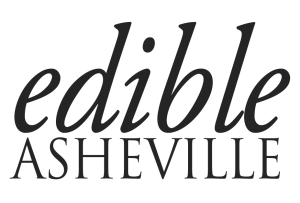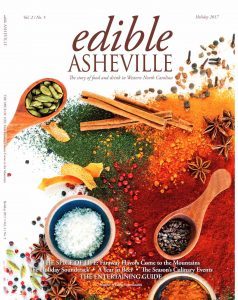WHAT’S IN A NAME
By Kay West
***
When visiting your favorite Asheville restaurants, look for the names of these five farms on the menus. They’re part of the network of local growers and producers that work with chefs to create the city’s award-winning food.
Sunburst Trout Farms
Supplies Rainbow Trout | Waynesville, NC
Sunburst Trout is so ubiquitous on Asheville and Western North Carolina menus that many diners think it’s a particular species of trout. (It is, in fact, rainbow trout). Sunburst, rather, is the name of the business that supplies the fish to about 150 Western North Carolina restaurants.
Founded in Haywood County by Dick Jennings Jr., it’s been around since 1948. “Our trout are fed an all-natural diet which has a natural colorant, like a carotene, that gives them a reddish hue,” says Wes Eason, Jennings’ grandson, owner and director of sales. “When people see the color, they think Sunburst is the perfect name.”
The most popular product purchased by restaurants is the skin-on boneless filet, and every chef puts their own spin on it depending on the season, especially at some of Asheville’s favorite downtown eateries. At Cúrate, for example, it’s charcoal-grilled with hazelnut picada, while at The Market Place, it’s pan-seared and served with Farm & Sparrow cream peas and kale. At Posana, meanwhile, the trout filet is plated with quinoa, roasted grapes, fennel, radicchio and labneh.
The product line has expanded over the years, and diners will find other Sunburst Trout Farms offerings on menus, including hickory smoked trout, cold smoked trout—a lox style popular at breakfast—smoked trout dip and trout caviar.
Eason admits he doesn’t order his own trout when he goes out to eat, though chefs frequently send out some version of Sunburst that always impresses. “It’s amazing what they come up with and it’s always so good,” he says. “The only thing I haven’t seen done with our trout products is dessert, but I wouldn’t be surprised—and it would probably be great.”

Sunburst Trout Farms
Hickory Nut Gap
Meats Supplies Beef and Pork | Fairview, NC
Jamie Ager, a fourth-generation farmer at Hickory Nut Gap Farm, still remembers the thrill of his first sale to an Asheville restaurant in 2003: 20 pounds of hamburger meat to John Stehling, the former chef-owner of Asheville’s Early Girl Eatery.
“That first sale rocked my world,” Ager says. “We started delivering ground beef once a week to John. He had a sign on the wall that said they served local beef, and our name and logo right under it.”
Hickory Nut Gap Farm dates back to 1918, when Jim and Elizabeth McClure—Ager’s great-grandparents—settled on the land in Fairview, about 20 minutes southeast of Asheville. Every generation since then has been raised on the farm, including Ager and his three brothers. After graduating from Warren Wilson College with a degree in sustainable agriculture, Jamie returned to the farm with wife, Amy, whom he met at Warren Wilson and has the same degree.
HNG has been retailing its grass-fed, pasture-raised beef since 2001 at the North Asheville Tailgate Market. Initially, their purpose for also selling to restaurants was utilization, making sure they could sell every part of the cow, beyond just steaks.
He laughs when he repeats his early sales pitch to chefs. “How would you like to pay twice as much for your meat?” But enough of them were sold on the promise of better flavor and the opportunity to support local agriculture that HNG built a loyal wholesale clientele for their beef and pork, among them popular local restaurants like Asheville Proper, Chestnut and Copper Crown.
Ager is a fan of Sierra Nevada Taproom’s pot roast grilled cheese sandwich, which features HNG slow-roasted beef, fontina, muenster and aged white cheddar cheeses, with Rad Little Thing IPA onion jam on house white bread.
Ager encourages people to visit the farm, where the Hickory Nut Gap Farm Store and Butchery sells beef, pork and poultry, house-made bologna, bacon and pâté, seasonal goods, prepared foods and products from other local makers like French Broad Chocolate, Matcha Nude, Dynamite Roasters Coffee, Asheville Tea, Spicewalla, Fermenti and Noble Cider.
“I’m always proud to see the Hickory Nut Gap name,” he says. “And grateful we have been able to create a business with all these Asheville partners.”
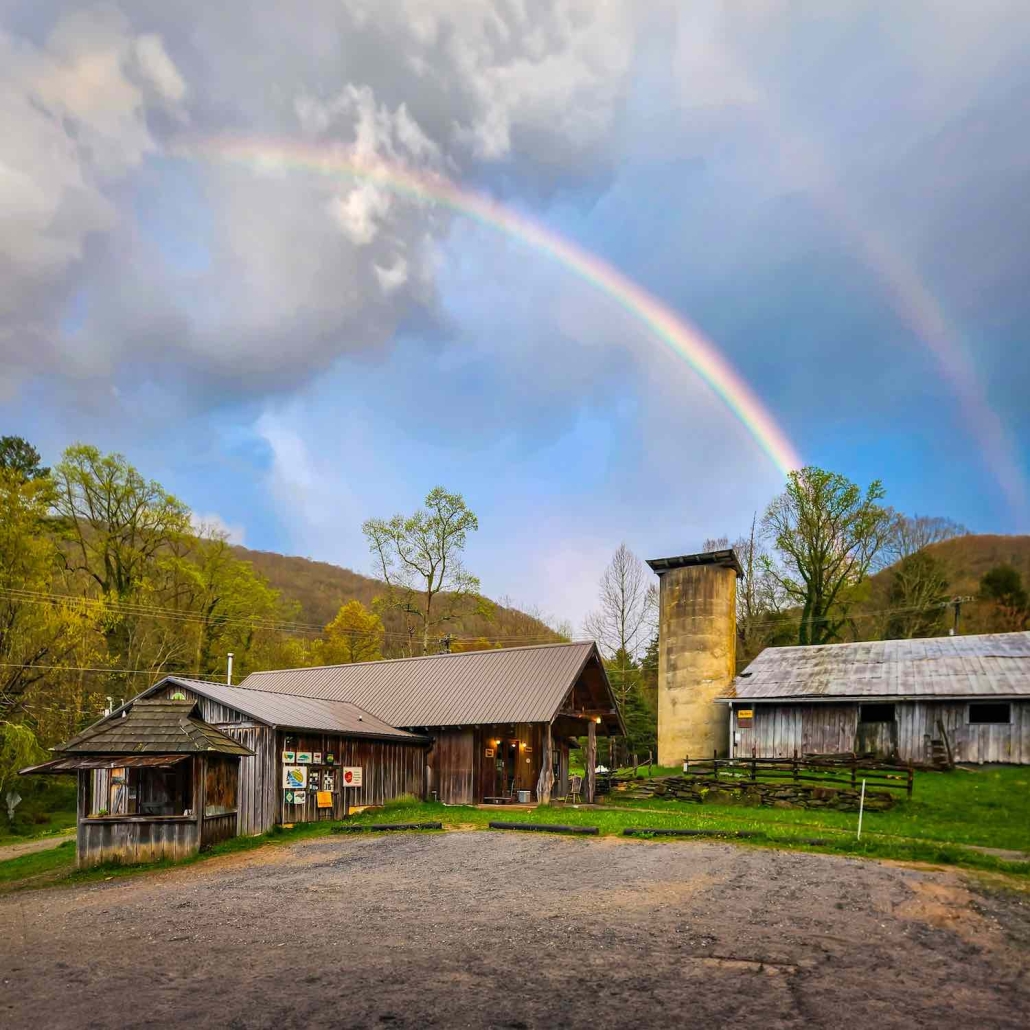
Hickory Nut Gap Farm
Black Trumpet Farm
Supplies Mushrooms | Leicester, NC
When Gwen and Jay Englebach appeared at a local tailgate market in 2019, introducing a lion’s mane mushroom they cultivate at Black Trumpet Farm in Leicester, it piqued people’s interest and elicited questions. With its unique shape, people wanted to know how the fungus tasted and how it could be prepared.
Fortunately for the Englebachs, once Asheville chefs discovered Black Trumpet Farm, they had plenty of ideas for the mushroom variety. The couple now grows it in a 2,000-square-foot climate-controlled facility they built in 2022, replacing the “glorified shed” they started in.
“We did a lot of cold calls to restaurants in the beginning,” Jay recalls. “We’d take sample boxes, as pretty as we could make them, right to the kitchens, talk to chefs about what they wanted and what we could do.”
As it turns out, Black Trumpet could do quite a bit; currently they’re producing about 750 pounds of mushrooms a week, spread among their core seven or eight varieties. Their mainstays are grey oyster and lion’s mane; certain varieties like king trumpet and maitake are a little more coveted, but both are tricky to grow.
“Chefs do want a specific thing sometimes for a specific menu item and we do our best to make sure they get it, but a lot of places are just happy to have a variety,” says Jay.
Diners will find Black Trumpet Farm mushrooms on plates from Luminosa, Jargon, Tall John’s, Table, Twisted Laurel, and Plant, among many more, and used in a variety of ways—in dishes, on pizza and focaccia, and as starters and sides.
“I appreciate the shout-out when restaurants name us on the menu, especially when the parents are in town and we take them out,” he says with a laugh. “It makes them proud.”
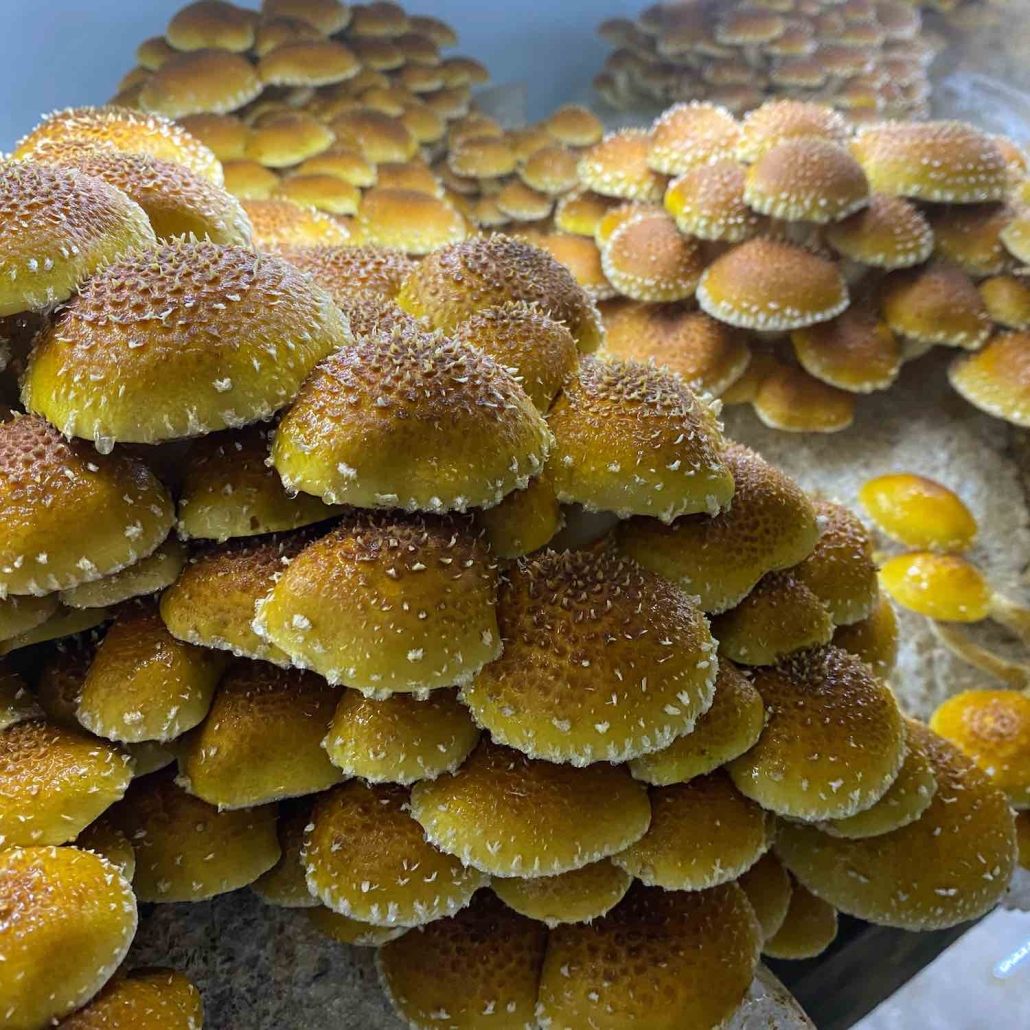
Black Trumpet Farm
.
The Culinary Gardener
Supplies Seasonal Produce | Weaverville, NC
Since he was a teenager growing up in a suburb of New York City, Evan Chender’s professional and personal interests have been entwined in food, drawn to both cooking and growing. He held jobs in restaurants, grew produce in his backyard and earned a BA in Food Culture and Sustainable Agriculture from Vassar College, deeply immersed in the experimental garden’s year-round growing program.
He took jobs in New York’s Hudson Valley and in Tuscany, Italy, which produced food specifically for the restaurants on those properties and observed elevated farm-to-table cooking up close. He also worked for a month as a stagiaire (intern) at the notoriously grueling Noma in Copenhagen, which has been ranked among the best restaurants in the world.
In 2012, he moved to Asheville and got a job as a chef/gardener for Well-Bred Bakery & Café, all while penning plans for a farm business on a small 8,000-square-foot plot of land. In the fall of 2013, he launched The Culinary Gardener, with a single-minded focus: “My intent from day one was just to grow for restaurants,” he says.
Because he was fluent in the language of chefs he connected well with them; his first client was Matt Dawes at The Bull and Beggar in the River Arts District, and his reputation for pristine produce grew quickly, placing The Culinary Gardener in the kitchens and on the menus of many of Asheville’s best restaurants.
He added acreage in Reems Creek Valley and now grows year-round. His radicchio is revered; he has cultivated as many as 30 varieties and calls their six-month season the cornerstone of his winter production.
Seasonal harvests are similar to others in the region. “What makes Culinary Gardener’s stand out is variety, selection and how we prepare them for sale,” Chender says, “harvesting them at the right size, getting them really clean and packaging them appropriately so restaurants can use them right out of the box.”
Looking Glass Creamery
Supplies Cheese | Columbus, NC
In 2009, Jen and Andy Perkins were considering which of two states to settle in with their young son—Washington or North Carolina. When Jen, a novice cheesemaker aspiring to make it a career, heard of a program in North Carolina whereby the state loans out pasteurizing equipment to up-and-coming cheesemakers, the couple bought a log cabin in Fairview, built a small creamery next door and used the loaner equipment to start processing 50 gallons of milk a week.
“We did what a lot of young cheesemakers do,” Jen recalls. “We started with fresh cheese, which you can make and get out the door in two days and get some cash flow.”
The first purchaser of Looking Glass Creamery cheese was Trout Lily Market in Fairview. When Jamie Ager of Hickory Nut Gap Farm invited her to ride along with him as he made meat deliveries to Asheville restaurants, she brought along samples and price lists and Looking Glass was on its way. Early buyers were Early Girl Eatery and Biscuit Head. With experience and more milk from nearby sources, Looking Glass began expanding the types of cheese they made and adding to their customer base.
In 2017, the Perkinses bought the property known as Harmon Dairy, located in Columbus, about 45 minutes south of Asheville. The new creamery began production in 2018, and their onsite farm store opened in 2019. Many of their sales remain to Asheville restaurants: All Souls Pizza features the fromage blanc and mozzarella on their Greens Pizza, while Leo’s House of Thirst tops a chanterelle tartine starter with whipped fromage blanc and uses Looking Glass aged cheese on a grilled cheese sandwich.
The recognition the creamery receives from restaurants helps drive visitors to the dairy and the farm store, where people can peek into one of the four underground cellars, see the animals, walk the property, get a bite to eat, something to drink, a scoop of ice cream and wedges of Looking Glass Creamery cheese to take home.
“Having our name on a menu is so important,” says Jen. “Asheville supports Asheville and it’s a big part of what makes this area so authentic and special.”
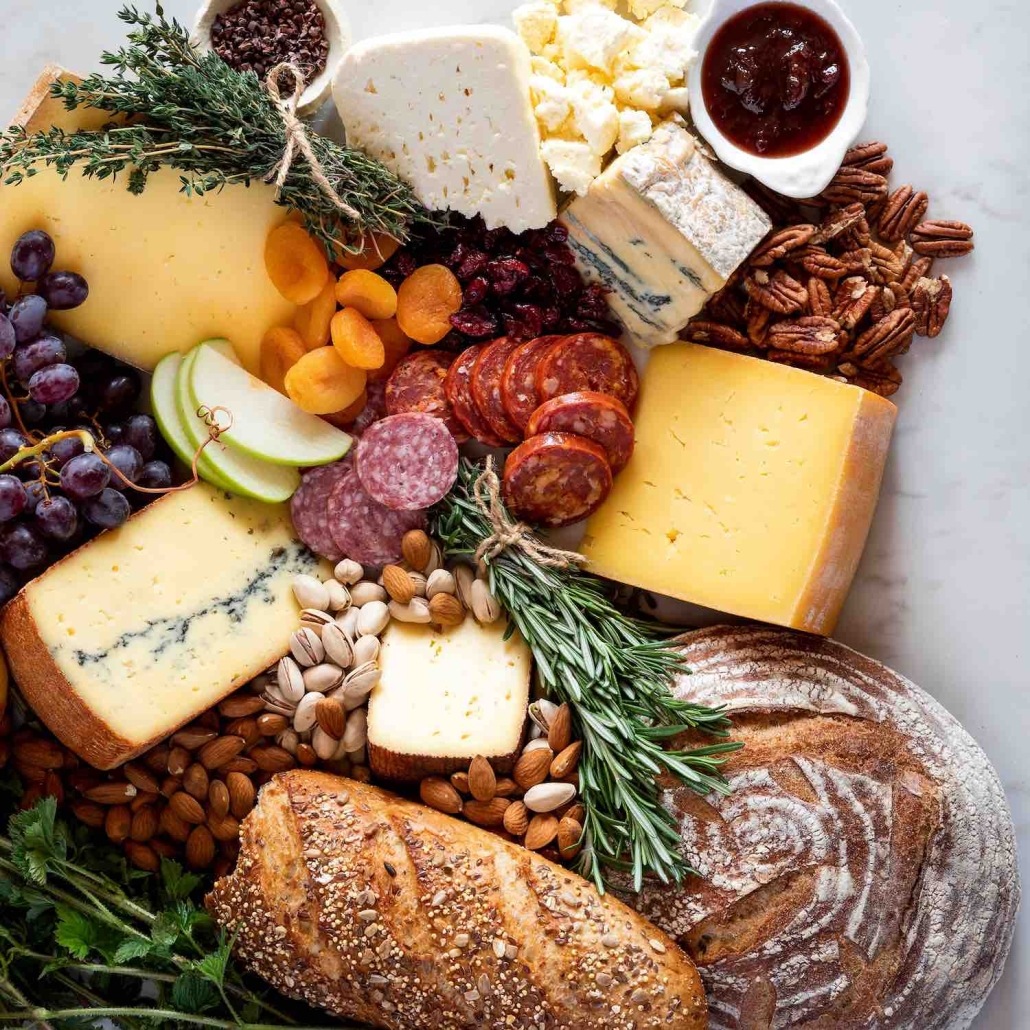
The cheese at Looking Glass Farm
Save
Save
Save
Save
Save
Save
Save
Save
Save
Save
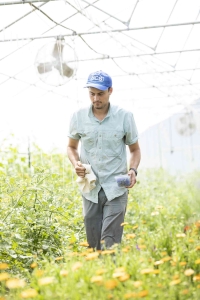
Evan Chender of The Culinary Gardener
THE WEEKLY REVEL
Sign up for your free handpicked guide to enjoying life around Asheville.
Available weekly from May to October.

